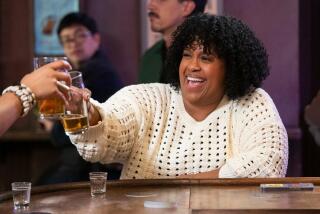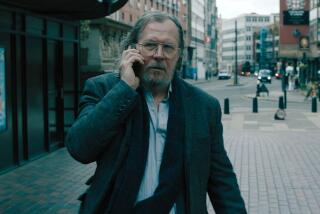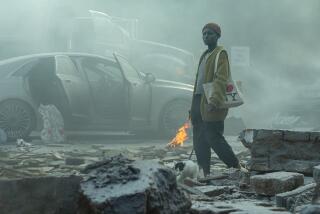Indie Focus: Todd Solondz trains his eye on the underdog again
With such films as “Welcome to the Dollhouse,” “Happiness,” “Palindromes” and “Life During Wartime,”writer-director Todd Solondz has spent years chronicling the secret underbelly of unfulfilled potential, thwarted ambition and unresolved desire in American suburban life.
With his newest release, “Dark Horse,”Solondz adds to the mix his singular take on the comedy convention that inevitably sees an immature schlub romantically linked with a woman who probably should be out of his league.
“It’s not a very sentimental take on the man-child genre, but it’s the story of a character that I am moved by,” said Solondz, speaking by phone from the Czech Republic, where he was traveling with the film. “I am always taken with the challenge of bringing an audience close to the heart of someone who they would rather dismiss out of hand.”
In “Dark Horse,” which opened in theaters Friday, Solondz trains his eye on the character of Abe (Jordan Gelber), a thirtysomething in New Jersey who lives with his parents (Christopher Walken and Mia Farrow), works at his father’s property development company and obsessively collects action figures.
He meets Miranda, a depressive woman played by Selma Blair, and while the two don’t fall in love exactly, each recognizes something in the other — though Miranda realizes that settling for Abe will mean a future far less bright than one she might have envisioned for herself.
The film, which marks the first theatrical release for distributor Brainstorm Media, is formally challenging too, sliding between dream and reality and even subtly shifting its point of view. Characters sometimes abruptly appear where they shouldn’t be, as Jordan’s internal dialogue at times takes over the action.
“There is a kind of destabilizing effect that happens as his dream life gets reinvigorated,” said Solondz, 52. “You have to make that leap of faith to stick with it.”
Gelber, who earned acclaim for his role in the original Broadway production of the Tony Award-winning musical “Avenue Q,” said he immediately responded to the character of Abe, though he didn’t recognize straightaway the genre satire in “Dark Horse.”
“That didn’t enter into my mind until my wife asked me what it was and I said it’s kind of like ‘The 40-Year-Old Virgin’ if Todd directed it,” he said. “When I first read it I just found it so funny and so devastating at the same time.”
Funny and devastating might be an easy way to describe much of Solondz’s filmography. Notorious for his confrontational taboo-busting style — “Happiness” and “Storytelling” famously ran into ratings troubles — he has wrenched humor and pathos from child abuse, teen abortion, loneliness and a gallery of outsiders looking in from the fringe.
A native of New Jersey, the place that would become his main cinematic stamping grounds, he is married with two small children and is an adjunct professor of filmmaking at New York University. Solondz took a semester off to shoot the $2 million “Dark Horse” in 2010 and subsequently balanced a class schedule with the editing of the film, which premiered last year at the Venice Film Festival and also played Toronto’s fall festival to generally strong reviews.
“My movies always have an ambivalent response,” Solondz said. “Some people are very affected, and some are nonplused. I find it more telling of the viewer in some sense than of me.”
More so than other independent filmmakers who frequently revisit the same thematic turf, Solondz comes under fire for rehashing the same material — a charge bolstered perhaps by the way his films often seem interrelated and self-referential: In the “Dark Horse” credits, for example, Blair’s character is identified as “Miranda (Formerly ‘Vi’)” to winkingly recall the actress’ role as an aspiring writer from 2001’s “Storytelling.” (A character from “Palindromes” reappears as a toy-store clerk as well.)
Fair or not, the perception hasn’t helped Solondz’s work at the box office. The filmmaker points out that each of his films has earned some percentage less than its predecessor.
“I suppose it’s not unfair to characterize my career as something of a dark horse one,” Solondz said. “Certainly when you look at these films no one would have imagined that I would be able to continue along these lines for this long.”
“Dark Horse” producer Ted Hope, who worked with Solondz on the controversial 1998 film “Happiness” and has remained close to the filmmaker through the years, acknowledges that at times the filmmaker’s reputation as the misanthrope poet of suburbia can turn off potential audiences.
“I’ve had back-and-forth with people: Is Todd making fun of his characters or not?” said Hope. “And I feel with great conviction that he loves these characters.... You can see his sympathy and compassion, even if you don’t have to like them as people. And Todd likes challenging characters, that’s who populates his world.”
Though his characters might seem outwardly unlikable, they obviously hold a certain appeal for actors. Solondz directed Paul Giamatti and Philip Seymour Hoffman at pivotal career moments, and Ben Gazzara, Dylan Baker, Jennifer Jason Leigh, Michael Kenneth Williams, Ally Sheedy, Ciarán Hinds and Allison Janney, among others, have all worked with the filmmaker.
“I don’t find his films nasty like some people do or think he has it out for people,” Blair said. “I think he truly is a storyteller who listens to people’s lives. He writes what he sees, and I don’t think he judges it. I think when we are in our quiet moments, we’re not attractive. We’re pretty sad-looking people when no one is watching.”
More to Read
Only good movies
Get the Indie Focus newsletter, Mark Olsen's weekly guide to the world of cinema.
You may occasionally receive promotional content from the Los Angeles Times.











